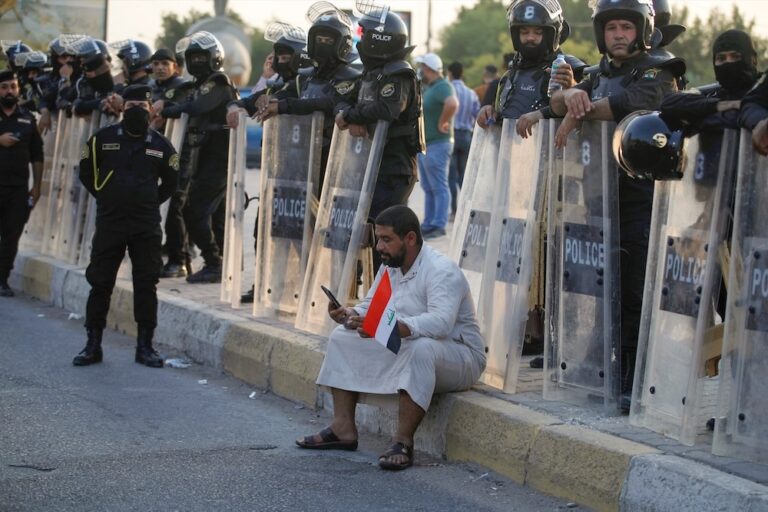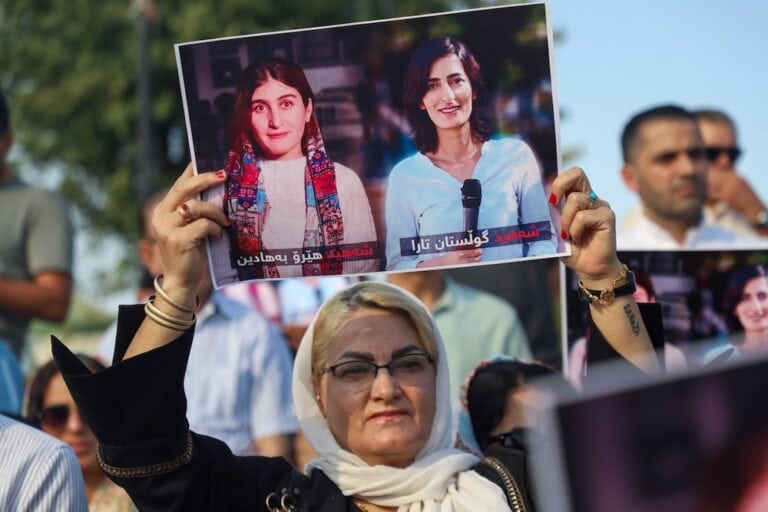(RSF/IFEX) – RSF has expressed outrage over the 28 June 2005 murder of Iraqi television producer Ahmed Wael Al Bakri. Al Bakri, 30, a producer with the privately-owned television station al-Sharqiya, was killed at the wheel of his car when he drove too close to a United States (US) military convoy. He produced a variety […]
(RSF/IFEX) – RSF has expressed outrage over the 28 June 2005 murder of Iraqi television producer Ahmed Wael Al Bakri.
Al Bakri, 30, a producer with the privately-owned television station al-Sharqiya, was killed at the wheel of his car when he drove too close to a United States (US) military convoy. He produced a variety programme and another dealing with life’s everyday problems. His death brings to 60 the number of journalists and other media workers killed in Iraq since the start of the conflict in March 2003.
“It is not the first time that US soldiers have targeted a journalist after wrongly concluding that his vehicle could be booby-trapped,” said RSF. “We urge the US Army to show greater judgement and vigilance, to avoid such unacceptable shooting blunders. An investigation should be opened urgently, not with the aim of whitewashing the army, but with the aim of shedding light on this death.”
On 29 June, a spokesman for the Baghdad-based 3rd Infantry Division told Agence France-Presse (AFP) that a US unit was implicated in Al Bakri’s death and an investigation had been launched.
In another unrelated incident, RSF has called for information about the arrest of a documentary filmmaker and his cameraman.
Cyrus Kar, a US national of Iranian origin, and his Iranian cameraman, Farshid Faraji, were both arrested in Iraq on 2 May while making a documentary entitled, “In Search of Darius the Great”.
After filming the first part of their documentary in Iran, Afghanistan, Tajikistan and Turkey, Kar and Faraji went to Iraq. They had received permission to film in the country from both the American and Iraqi governments.
Iraqi police arrested them shortly after they arrived in Baghdad. After finding that Kar was a US national, they handed him over to the US Army. He has since been held at Camp Cropper, a detention centre located close to Baghdad airport. The FBI searched his home and made him take a lie-detector test. He is still being held by the US Army, who have released no information about him.
Nothing has been heard of Faraji since his arrest. His name does not appear on the list of prisoners drawn up by the Red Cross in Iraq.
Finally, RSF expressed revulsion at the murder of journalist Jassim Al Qais, of the daily “Al Siyada”, who was shot dead on 22 June, along with his son, as they travelled on a road 10 kilometres north of Baghdad.
“This vile act reminds us that Iraq is the world’s most dangerous country for journalists,” the organisation said. “The state of security in the country is so appalling that armed men can murder a journalist in broad daylight. In this way, the killers gradually stifle news and information in the country. We point out yet again that journalists are neutral observers whose work should be protected irrespective of their nationality or the media they work for.”
RSF’s correspondent in Baghdad said the journalist was at the wheel of his Kia vehicle when armed men opened fire, killing him and his son instantly. The motive for the murder is not yet known.


